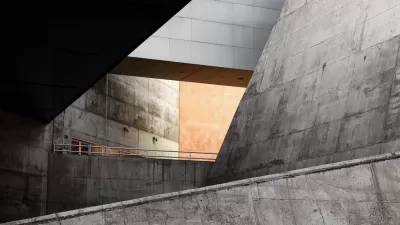An unfamiliar title for a familiar collection of concepts, psychogeography examines the good and bad effects of environments on the thoughts and feelings of people.

Ryan Holleywell interviews Colin Ellard, author of Places of the Heart: the Psychogeography of Everyday Life, about "the ways psychology, architecture, and urban design intersect."
The interview begins with the critical matter of defining the term psychogeography. Ellard explains: "The origins of the term were in a French philosophical movement some time ago. It was their intent to make people aware of the extent to which our surroundings, especially in cities, condition the things we do and think – and not necessarily in benevolent ways."
Thus psychogeography would certainly be a concern of planners and urban designers of various stripes. As an example of the possible meaning to be drawn from examining places though the lens of psychogeography, Ellard references a story he recently wrote describing how boring cityscapes increase depression, addiction, and disease-related stress.
Ellard's main message for planners and architects: "we have to make considerations for the psychological well being of urban residents." Those considerations, however, have taken a back seat until recently. Such considerations, argues Ellard, are just as important as transportation and other forms of infrastructure.
FULL STORY: Why Cities Should Embrace “Psychogeography”

Planetizen Federal Action Tracker
A weekly monitor of how Trump’s orders and actions are impacting planners and planning in America.

Vehicle-related Deaths Drop 29% in Richmond, VA
The seventh year of the city's Vision Zero strategy also cut the number of people killed in alcohol-related crashes by half.

Can We Please Give Communities the Design They Deserve?
Often an afterthought, graphic design impacts everything from how we navigate a city to how we feel about it. One designer argues: the people deserve better.

Missouri Tenants Sue Housing Owners Over Tax Credit Program
In Springfield, Missouri, organized tenants have filed a lawsuit against the past and present owners of their tax credit–financed properties, claiming that in exercising an opt-out provision they violated both state and federal requirements.

Judge Halts Trump Order Tying State Transportation Grants to Immigration Actions
Ruling applies to Colorado, which was among 20 plaintiff states.

New York MTA to Reimagine Subway Bottleneck
Changes proposed in a recently approved five-year plan would resolve a nearly century-old snarl that routinely delays trains.
Urban Design for Planners 1: Software Tools
This six-course series explores essential urban design concepts using open source software and equips planners with the tools they need to participate fully in the urban design process.
Planning for Universal Design
Learn the tools for implementing Universal Design in planning regulations.
Borough of Carlisle
Smith Gee Studio
City of Camden Redevelopment Agency
City of Astoria
Transportation Research & Education Center (TREC) at Portland State University
City of Camden Redevelopment Agency
Municipality of Princeton (NJ)





























